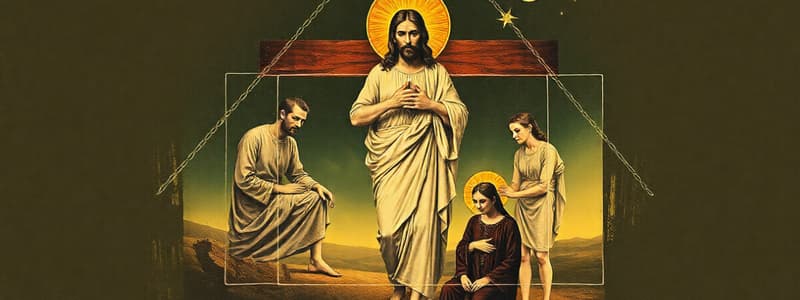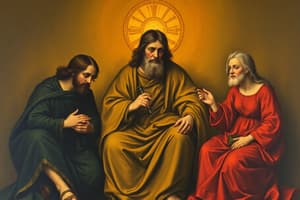Podcast
Questions and Answers
The Holy Spirit inspires the [ ].
The Holy Spirit inspires the [ ].
- Scripture (correct)
- The Trinity
- Sina Effects
- Dignity
The [ ] is just a collection of myths.
The [ ] is just a collection of myths.
- Dignity
- Bible (correct)
- Trinity
- Creation
The Trinity refers to three gods.
The Trinity refers to three gods.
False (B)
The Paschal Mystery is [ ] the understanding of the Bible.
The Paschal Mystery is [ ] the understanding of the Bible.
God encourages [ ].
God encourages [ ].
The purpose of parables is to help us understand temptation.
The purpose of parables is to help us understand temptation.
The Kingdom of God is [ ].
The Kingdom of God is [ ].
The Luminous Mysteries happened before baptism.
The Luminous Mysteries happened before baptism.
The responsibility for discerning right from wrong is [ ].
The responsibility for discerning right from wrong is [ ].
Evangelization is [ ].
Evangelization is [ ].
The Virgin Mary rejected God's will.
The Virgin Mary rejected God's will.
A person is saved by doing good works.
A person is saved by doing good works.
Flashcards
What is the Holy Spirit?
What is the Holy Spirit?
The Holy Spirit is the third person of the Trinity, alongside the Father and the Son. The Holy Spirit inspires and guides the Church, bringing us closer to God.
Define Faith and Reason
Define Faith and Reason
Faith is believing in what we cannot see, trusting in God's promises even when we don't fully understand. Reason is the use of logic and understanding.
Who were Adam and Eve?
Who were Adam and Eve?
Adam and Eve were the first humans created by God. They chose to disobey God, leading to sin entering the world.
What is the dignity of man and woman?
What is the dignity of man and woman?
Signup and view all the flashcards
What are the effects of sin?
What are the effects of sin?
Signup and view all the flashcards
How is Scripture inspired by God?
How is Scripture inspired by God?
Signup and view all the flashcards
What languages and books make up the Bible?
What languages and books make up the Bible?
Signup and view all the flashcards
What is the Holy Trinity?
What is the Holy Trinity?
Signup and view all the flashcards
How did God create the world?
How did God create the world?
Signup and view all the flashcards
What did God promise Adam and Eve and what did he promise us?
What did God promise Adam and Eve and what did he promise us?
Signup and view all the flashcards
What does sin do to us?
What does sin do to us?
Signup and view all the flashcards
What did Christ do for us?
What did Christ do for us?
Signup and view all the flashcards
How do grace and temptation relate?
How do grace and temptation relate?
Signup and view all the flashcards
What are the effects of original sin?
What are the effects of original sin?
Signup and view all the flashcards
What was the covenant with Abraham?
What was the covenant with Abraham?
Signup and view all the flashcards
Who are the Chosen People?
Who are the Chosen People?
Signup and view all the flashcards
What is YHWH?
What is YHWH?
Signup and view all the flashcards
Who did Jesus save?
Who did Jesus save?
Signup and view all the flashcards
What is the role of prophets?
What is the role of prophets?
Signup and view all the flashcards
How did Jesus experience fear and suffering?
How did Jesus experience fear and suffering?
Signup and view all the flashcards
How did original sin begin?
How did original sin begin?
Signup and view all the flashcards
What is the Paschal Mystery?
What is the Paschal Mystery?
Signup and view all the flashcards
What is a covenant?
What is a covenant?
Signup and view all the flashcards
What is the Exodus?
What is the Exodus?
Signup and view all the flashcards
What is Passover?
What is Passover?
Signup and view all the flashcards
What is the Promised Land?
What is the Promised Land?
Signup and view all the flashcards
What is the Kingdom of God?
What is the Kingdom of God?
Signup and view all the flashcards
What is the Suffering Servant?
What is the Suffering Servant?
Signup and view all the flashcards
What is the value of suffering?
What is the value of suffering?
Signup and view all the flashcards
What does 'Incarnate' mean?
What does 'Incarnate' mean?
Signup and view all the flashcards
What is the nature of Jesus?
What is the nature of Jesus?
Signup and view all the flashcards
What is Mary's relationship with sin?
What is Mary's relationship with sin?
Signup and view all the flashcards
Study Notes
Blooket Questions and Answers
-
Holy Spirit and Scripture: The Holy Spirit inspires Scripture. Scripture is not simply myths written by humans.
-
Trinity: The Trinity is not three gods, but a single God in three persons.
-
Creation: God created everything.
-
Original Sin: Original sin is the consequence of Adam and Eve's disobedience.
-
Paschal Mystery: The Paschal Mystery is Christ's passion, death, and resurrection.
-
Suffering Servant: The Suffering Servant, a figure in Isaiah, describes a person who suffers for others.
-
Incarnation: The Incarnation is God becoming human. It's not just suffering.
-
Sanctifying Grace: Sanctifying grace is a gift of God's grace that makes us holy.
-
Parables: Parables are symbolic stories used to teach moral lessons.
-
Satan's Temptation of Christ: Satan tempted Christ throughout his life, but Christ did not sin.
-
Kingdom of God: The Kingdom of God is not just a heavenly place, it is a present reality.
-
Last Supper: The Last Supper was a symbolic meal that Jesus shared with his disciples.
-
Luminous Mysteries: The Luminous Mysteries are significant events in Jesus' public life.
-
Christ and Forgiveness: Christ offers forgiveness.
-
Sacraments: Sacraments are effective signs of grace.
-
Virgin Mary: The Virgin Mary is greatly respected and honored in Christianity.
-
Purgatory: Purgatory is an intermediary state for those who die in God's grace.
-
Betrothal: Betrothal is a legally binding engagement before marriage in certain historical contexts.
-
Evangelization: This is the act of spreading the Good News.
-
Conscience: Conscience helps us discern right from wrong and guides moral decisions. The conscience itself isn't the only measure of right and wrong.
-
Judgment: There are different types of divine judgment, individual, and universal.
-
Resurrection: Jesus' resurrection happened and is a central Christian belief.
-
Baptism: Baptism is a sacrament of initiation into the Christian community.
-
Sacrament of Reconciliation: This sacrament is about receiving forgiveness.
-
Immaculate Conception: This belief states that Mary was conceived without original sin.
-
Pentecost: The Pentecost event marked the birth of the Church.
-
Exodus: The Exodus is a journey of liberation of the Israelites from Egypt.
-
Chosen People of God: God chose specific people to be in relationship with Him.
-
Prophets: Prophets speak for God.
-
YHWH/Yahweh: This is a name for God used in the Hebrew Bible.
-
Cain's Jealousy: Cain's sin of jealousy highlights a struggle with sin and human nature
-
The Church: The Church is often described in the Catechism of the Catholic Church, and has a divine authority. This means the Church is fundamentally connected to the teachings of God. Salvation is possible through Christ.
-
Moral Responsibility: All people, not just the religious, are morally responsible for their actions and choices. Not all religions teach this.
Studying That Suits You
Use AI to generate personalized quizzes and flashcards to suit your learning preferences.




